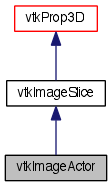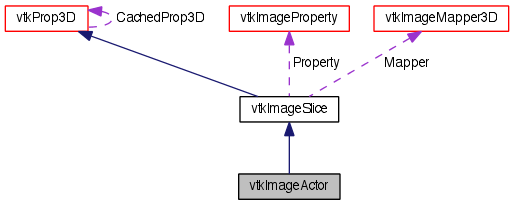draw an image in a rendered 3D scene More...
#include <vtkImageActor.h>


Detailed Description
draw an image in a rendered 3D scene
vtkImageActor is used to render an image in a 3D scene. The image is placed at the origin of the image, and its size is controlled by the image dimensions and image spacing. The orientation of the image is orthogonal to one of the x-y-z axes depending on which plane the image is defined in. This class has been mostly superseded by the vtkImageSlice class, which provides more functionality than vtkImageActor.
- Examples:
- vtkImageActor (Examples)
- Tests:
- vtkImageActor (Tests)
Definition at line 48 of file vtkImageActor.h.
Member Typedef Documentation
Reimplemented from vtkImageSlice.
Definition at line 51 of file vtkImageActor.h.
Constructor & Destructor Documentation
| vtkImageActor::vtkImageActor | ( | ) | [protected] |
| vtkImageActor::~vtkImageActor | ( | ) | [protected] |
Member Function Documentation
| static int vtkImageActor::IsTypeOf | ( | const char * | name | ) | [static] |
Return 1 if this class type is the same type of (or a subclass of) the named class. Returns 0 otherwise. This method works in combination with vtkTypeMacro found in vtkSetGet.h.
Reimplemented from vtkImageSlice.
| virtual int vtkImageActor::IsA | ( | const char * | name | ) | [virtual] |
Return 1 if this class is the same type of (or a subclass of) the named class. Returns 0 otherwise. This method works in combination with vtkTypeMacro found in vtkSetGet.h.
Reimplemented from vtkImageSlice.
| static vtkImageActor* vtkImageActor::SafeDownCast | ( | vtkObjectBase * | o | ) | [static] |
Reimplemented from vtkImageSlice.
| virtual vtkObjectBase* vtkImageActor::NewInstanceInternal | ( | ) | const [protected, virtual] |
Reimplemented from vtkImageSlice.
| vtkImageActor* vtkImageActor::NewInstance | ( | ) | const |
Reimplemented from vtkImageSlice.
| void vtkImageActor::PrintSelf | ( | ostream & | os, |
| vtkIndent | indent | ||
| ) | [virtual] |
Methods invoked by print to print information about the object including superclasses. Typically not called by the user (use Print() instead) but used in the hierarchical print process to combine the output of several classes.
Reimplemented from vtkImageSlice.
| static vtkImageActor* vtkImageActor::New | ( | ) | [static] |
Instantiate the image actor.
Reimplemented from vtkImageSlice.
| virtual void vtkImageActor::SetInputData | ( | vtkImageData * | ) | [virtual] |
Set/Get the image data input for the image actor. This is for backwards compatibility, for a proper pipeline connection you should use GetMapper()->SetInputConnection() instead.
| virtual vtkImageData* vtkImageActor::GetInput | ( | ) | [virtual] |
Set/Get the image data input for the image actor. This is for backwards compatibility, for a proper pipeline connection you should use GetMapper()->SetInputConnection() instead.
| virtual void vtkImageActor::SetInterpolate | ( | int | ) | [virtual] |
Turn on/off linear interpolation of the image when rendering. More options are available in the Property of the image actor.
| virtual int vtkImageActor::GetInterpolate | ( | ) | [virtual] |
Turn on/off linear interpolation of the image when rendering. More options are available in the Property of the image actor.
| virtual void vtkImageActor::InterpolateOn | ( | ) | [virtual] |
Turn on/off linear interpolation of the image when rendering. More options are available in the Property of the image actor.
| virtual void vtkImageActor::InterpolateOff | ( | ) | [virtual] |
Turn on/off linear interpolation of the image when rendering. More options are available in the Property of the image actor.
| virtual void vtkImageActor::SetOpacity | ( | double | ) | [virtual] |
Set/Get the object's opacity. 1.0 is totally opaque and 0.0 is completely transparent.
| virtual double vtkImageActor::GetOpacity | ( | ) | [virtual] |
Set/Get the object's opacity. 1.0 is totally opaque and 0.0 is completely transparent.
| double vtkImageActor::GetOpacityMinValue | ( | ) | [inline] |
Set/Get the object's opacity. 1.0 is totally opaque and 0.0 is completely transparent.
Definition at line 78 of file vtkImageActor.h.
| double vtkImageActor::GetOpacityMaxValue | ( | ) | [inline] |
Set/Get the object's opacity. 1.0 is totally opaque and 0.0 is completely transparent.
Definition at line 79 of file vtkImageActor.h.
| void vtkImageActor::SetDisplayExtent | ( | int | extent[6] | ) |
The image extent is generally set explicitly, but if not set it will be determined from the input image data.
The image extent is generally set explicitly, but if not set it will be determined from the input image data.
| void vtkImageActor::GetDisplayExtent | ( | int | extent[6] | ) |
The image extent is generally set explicitly, but if not set it will be determined from the input image data.
| int* vtkImageActor::GetDisplayExtent | ( | ) | [inline] |
The image extent is generally set explicitly, but if not set it will be determined from the input image data.
Definition at line 89 of file vtkImageActor.h.
| double* vtkImageActor::GetBounds | ( | ) | [virtual] |
Get the bounds of this image actor. Either copy the bounds into a user provided array or return a pointer to an array. In either case the boudns is expressed as a 6-vector (xmin,xmax, ymin,ymax, zmin,zmax).
Reimplemented from vtkImageSlice.
| void vtkImageActor::GetBounds | ( | double | bounds[6] | ) | [inline] |
Get the bounds of this image actor. Either copy the bounds into a user provided array or return a pointer to an array. In either case the boudns is expressed as a 6-vector (xmin,xmax, ymin,ymax, zmin,zmax).
Reimplemented from vtkImageSlice.
Definition at line 98 of file vtkImageActor.h.
Get the bounds of the data that is displayed by this image actor. If the transformation matrix for this actor is the identity matrix, this will return the same value as GetBounds.
| void vtkImageActor::GetDisplayBounds | ( | double | bounds[6] | ) |
Get the bounds of the data that is displayed by this image actor. If the transformation matrix for this actor is the identity matrix, this will return the same value as GetBounds.
Return the slice number (& min/max slice number) computed from the display extent.
Return the slice number (& min/max slice number) computed from the display extent.
Return the slice number (& min/max slice number) computed from the display extent.
| void vtkImageActor::SetZSlice | ( | int | z | ) | [inline] |
Set/Get the current slice number. The axis Z in ZSlice does not necessarily have any relation to the z axis of the data on disk. It is simply the axis orthogonal to the x,y, display plane. GetWholeZMax and Min are convenience methods for obtaining the number of slices that can be displayed. Again the number of slices is in reference to the display z axis, which is not necessarily the z axis on disk. (due to reformatting etc)
Definition at line 125 of file vtkImageActor.h.
| int vtkImageActor::GetZSlice | ( | ) | [inline] |
Set/Get the current slice number. The axis Z in ZSlice does not necessarily have any relation to the z axis of the data on disk. It is simply the axis orthogonal to the x,y, display plane. GetWholeZMax and Min are convenience methods for obtaining the number of slices that can be displayed. Again the number of slices is in reference to the display z axis, which is not necessarily the z axis on disk. (due to reformatting etc)
Definition at line 129 of file vtkImageActor.h.
Set/Get the current slice number. The axis Z in ZSlice does not necessarily have any relation to the z axis of the data on disk. It is simply the axis orthogonal to the x,y, display plane. GetWholeZMax and Min are convenience methods for obtaining the number of slices that can be displayed. Again the number of slices is in reference to the display z axis, which is not necessarily the z axis on disk. (due to reformatting etc)
Set/Get the current slice number. The axis Z in ZSlice does not necessarily have any relation to the z axis of the data on disk. It is simply the axis orthogonal to the x,y, display plane. GetWholeZMax and Min are convenience methods for obtaining the number of slices that can be displayed. Again the number of slices is in reference to the display z axis, which is not necessarily the z axis on disk. (due to reformatting etc)
| virtual int vtkImageActor::HasTranslucentPolygonalGeometry | ( | ) | [virtual] |
Internal method, should only be used by rendering. Does this prop have some translucent polygonal geometry?
Reimplemented from vtkImageSlice.
| static int vtkImageActor::GetOrientationFromExtent | ( | const int | extent[6] | ) | [static, protected] |
Guess the orientation from the extent. The orientation will be Z unless the extent is single-slice in one of the other directions.
| vtkAlgorithm* vtkImageActor::GetInputAlgorithm | ( | ) | [protected] |
Member Data Documentation
int vtkImageActor::DisplayExtent[6] [protected] |
Definition at line 146 of file vtkImageActor.h.
double vtkImageActor::DisplayBounds[6] [protected] |
Definition at line 147 of file vtkImageActor.h.
The documentation for this class was generated from the following file:
- dox/Rendering/Core/vtkImageActor.h
 1.8.0
1.8.0